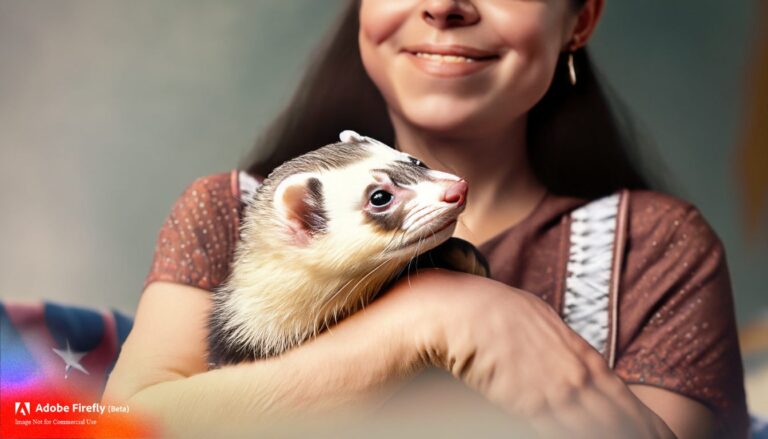
When it comes to our furry friends, we want to ensure they are getting the best nutrition possible. That’s why it’s essential to take a closer look at what’s in the bag of ferret kibble. Is it really providing all the necessary nutrients for our beloved pets? In this article, I’ll break down the ingredients commonly found in ferret kibble and discuss whether it is nutritionally sound. So, if you want to make sure your ferret is getting the best diet possible, keep reading to find out what’s really in their food.
Ferret kibble is a convenient option for many pet owners, but is it truly meeting our ferrets’ dietary needs? It’s crucial to understand the ingredients listed on the bag and how they contribute to our pets’ overall health. In this article, I’ll delve into the nutritional content of ferret kibble and evaluate its quality. By the end, you’ll have a better understanding of whether the kibble you’re feeding your ferret is truly providing the essential nutrients they need to thrive.
We all want the best for our furry companions, and their diet plays a significant role in their well-being. In this article, we’ll take a closer look at ferret kibble and analyze its nutritional value. By understanding what’s in the bag, you can make informed decisions about your ferret’s diet and ensure they are receiving the proper nourishment. So, let’s dive into the world of ferret kibble and discover if it’s truly nutritionally sound.
Key Takeaways
- Ferret kibble should have a high protein content, ideally listing high-quality animal proteins like chicken or turkey as the main ingredients.
- Fats are essential for ferrets and should come from healthy sources like chicken fat or fish oil.
- Carbohydrates should be limited in ferret kibble, with high-quality options like sweet potatoes or peas.
- Ferret kibble should be fortified with essential vitamins and minerals like vitamin A, vitamin E, taurine, and calcium.
- Avoid ferret kibble that contains fillers like corn, wheat, or soy, as well as artificial additives such as colors, flavors, or preservatives.
- Choose kibble that emphasizes high-quality ingredients, animal protein, appropriate fat levels, limited carbohydrates, and essential nutrients. Consult with a veterinarian for personalized guidance.
Breaking Down Ferret Kibble
When it comes to providing a balanced and nutritious diet for our furry companions, understanding the ingredients in ferret kibble is essential. Ferrets have specific dietary requirements that need to be met in order to keep them healthy and vibrant. So, let’s take a closer look at what goes into ferret kibble and evaluate if it is indeed nutritionally sound.
- Protein content: Ferrets are obligate carnivores, which means that their diet must consist primarily of meat. The protein content in ferret kibble should ideally be high to ensure that their dietary needs are met. Look for brands that list high-quality animal proteins, such as chicken or turkey, as the main ingredients.
- Fat levels: Ferrets have a high metabolic rate and require a diet that is rich in fat. Fat provides them with the energy they need to stay active throughout the day. Make sure that the fat levels in the kibble are appropriate for ferrets, and that they come from healthy sources like chicken fat or fish oil.
- Carbohydrates: While it’s important to provide some carbohydrates in a ferret’s diet, they should be limited. Ferrets have short digestive tracts and cannot process carbohydrates as efficiently as other animals. Look for kibble that contains limited, high-quality carbohydrates, such as sweet potatoes or peas.
- Vitamins and minerals: Ferret kibble should be fortified with essential vitamins and minerals to support their overall health. Look for brands that include vital nutrients like vitamin A, vitamin E, taurine, and calcium. These nutrients are crucial for maintaining good vision, a healthy coat, strong bones, and a robust immune system.
- Fillers and artificial additives: It’s important to avoid ferret kibble that contains unnecessary fillers, such as corn, wheat, or soy. These ingredients offer little nutritional value and can often lead to digestive issues. Additionally, steer clear of brands that use artificial colors, flavors, or preservatives.
Understanding the Ingredients
When it comes to feeding our furry friends, understanding the ingredients in their food is crucial. This is especially important for ferrets, as they have specific dietary needs that must be met for their optimal health. So let’s take a closer look at what should be in the bag of ferret kibble and evaluate its nutritional content.
Protein:
Ferrets are obligate carnivores, which means they require a diet that is high in animal protein. Look for ferret kibble that lists meat or meat meal as the first ingredient. Protein should make up around 30-40% of their diet. This ensures that their bodies receive the essential amino acids they need for growth, maintenance, and energy.
Fat:
Ferrets require a diet that is moderately high in fat. Fat should make up around 15-20% of their diet. Look for ferret kibble that includes healthy animal fats, such as chicken fat or fish oil. These fats provide essential fatty acids, which support healthy skin and coat, brain function, and overall wellbeing.
Carbohydrates:
Carbohydrates should be limited in a ferret’s diet, as they don’t have the same ability to digest them as humans do. Look for ferret kibble that contains limited, high-quality carbohydrates, such as sweet potatoes or peas. Carbohydrates should make up no more than 3-5% of their diet.
Vitamins and Minerals:
Ferret kibble should be formulated to provide all the essential vitamins and minerals to meet your ferret’s nutritional needs. Look for kibble that includes added vitamins A, E, and D, as well as minerals like calcium and phosphorus. These nutrients are crucial for healthy bones, teeth, and overall growth and development.
Fillers and Artificial Additives:
Avoid ferret kibble that contains unnecessary fillers, such as corn, wheat, or soy. These ingredients provide little nutritional value and can cause digestive upset in ferrets. Similarly, stay away from kibble that includes artificial additives, such as colors or flavors. Stick to kibble with natural, wholesome ingredients for the best nutritional value.
Evaluating Nutritional Content
When it comes to evaluating the nutritional content of ferret kibble, it’s important to understand the key components that contribute to a well-balanced diet for these small carnivores.
Here are some factors I consider when assessing the nutritional content of ferret kibble:
1. Protein content: Ferrets are obligate carnivores, which means they require a diet high in animal-based protein. Protein should make up around 30-40% of their diet. Look for ferret kibble that lists high-quality animal protein sources, such as chicken, turkey, or fish, as the main ingredients.
2. Fat levels: Fat is another essential component of a ferret’s diet. It provides them with energy and helps maintain healthy skin and coat. Look for kibble with a fat content of around 15-20%, derived from healthy animal fats.
3. Carbohydrate levels: Unlike humans, ferrets have a limited ability to digest and utilize carbohydrates. Their diets should be low in carbohydrates, typically no more than 3-5%. Excessive carbohydrates can lead to weight gain and digestive issues in ferrets.
4. Essential vitamins and minerals: Ferret kibble should also contain essential vitamins and minerals to support their overall health and wellbeing. These include vitamin A, vitamin D, vitamin E, taurine, and calcium. Make sure these nutrients are present in the kibble you choose.
These are some of the main criteria I use when evaluating the nutritional content of ferret kibble. It’s important to remember that every ferret is unique, and their dietary needs may vary. Consulting with a veterinarian is always a good idea to ensure you’re providing your ferret with a nutritionally sound diet.
Instead of having a conclusion paragraph, we will continue with the next section.
Is Ferret Kibble Quality?
When it comes to providing proper nutrition for our ferrets, the quality of their kibble plays a vital role. As a responsible ferret owner, it’s essential to understand what goes into their food and the impact it can have on their overall health and wellbeing.
High-Quality Ingredients
One of the key indicators of the quality of ferret kibble is the ingredients list. It’s crucial to look for kibble that contains high-quality, wholesome ingredients that meet the specific dietary needs of ferrets.
Animal Protein
Ferrets are obligate carnivores, which means they require a diet that is high in animal protein. The protein content should make up around 30-40% of their diet. Look for kibble that lists specific animal protein sources, such as chicken, turkey, or fish, as the first ingredient.
Appropriate Fat Levels
Ferrets also need an adequate amount of healthy fats in their diet. Fat should make up around 15-20% of their daily intake, and it should come from sources like animal fat or fish oil. Avoid kibble that contains excessive amounts of unhealthy fats or oils.
Limited Carbohydrates
While carbohydrates are not entirely detrimental to ferrets, they should be limited in their diet. Aim for kibble that contains no more than 3-5% carbohydrates. Avoid kibble that includes high quantities of grains, fillers, or unnecessary carbohydrates.
Essential Vitamins and Minerals
Ferret kibble should also contain essential vitamins and minerals that are necessary for their overall health. Look for kibble that is formulated with added vitamins A, D, E, and B complex, as well as minerals like calcium and phosphorus.
Avoid Unnecessary Fillers and Artificial Additives
Last but not least, it’s important to steer clear of kibble that contains unnecessary fillers and artificial additives. These ingredients not only offer minimal nutritional value but can also potentially be harmful to your ferret’s health. Look for kibble with natural, wholesome ingredients and avoid products that contain artificial colors, flavors, or preservatives.
By carefully evaluating the quality of ferret kibble, we can ensure that our furry friends are receiving a nutritionally sound diet that meets their specific dietary requirements. However, keep in mind that individual ferrets may have unique nutritional needs, so it’s always best to consult with a veterinarian for personalized guidance on your ferret’s diet.
Making Informed Decisions
When it comes to choosing the right ferret kibble, it’s crucial to gather all the necessary information to make an informed decision. This means evaluating the nutritional content and quality of the food you’re considering for your furry friend. As a responsible pet owner, you want to ensure that your ferret is getting the appropriate nutrients they need to thrive.
To make the best choice, there are a few key factors to consider:
- Protein Content: Ferrets are obligate carnivores, meaning they require a diet high in animal protein. Protein should make up approximately 30-40% of their diet. Look for kibble that contains high-quality, animal-based protein sources such as chicken, turkey, or lamb.
- Fat Levels: Fat is another essential component of a ferret’s diet, providing them with much-needed energy. It’s recommended that fat make up around 15-20% of their diet. When selecting ferret kibble, opt for those that derive fat from healthy animal sources rather than plant-based fats.
- Carbohydrate Levels: Ferrets have a limited ability to digest and utilize carbohydrates, so it’s important to keep their carbohydrate intake to a minimum. Ideally, carbohydrates should contribute no more than 3-5% of their diet. Be cautious of kibbles that contain excessive amounts of grains or fillers high in carbohydrates.
- Essential Vitamins and Minerals: A well-balanced ferret kibble should also include all the necessary vitamins and minerals to support their overall health. Look for kibbles that are fortified with taurine, which is crucial for a ferret’s heart and eye health. Other essential nutrients to look out for include vitamin A, vitamin D, and essential fatty acids.
By considering these factors, you can ensure that the ferret kibble you choose meets the nutritional needs of your furry friend. Nonetheless, it’s important to consult with a veterinarian to determine the specific dietary requirements of your individual ferret.
Remember, when it comes to your pet’s nutrition, making informed decisions is essential for their overall health and well-being. So take the time to evaluate the nutritional content and quality of the ferret kibble you’re considering, and consult with professionals to ensure your ferret is on the right track to a balanced diet.
Conclusion
Based on the evaluation of ferret kibble in this article, it is clear that understanding the ingredients and nutritional content of the food is crucial for providing a nutritionally sound diet for our ferret companions. Ferrets have specific dietary requirements, including high protein content, appropriate fat levels, and limited carbohydrates. It is important to choose kibble that meets these requirements and includes essential vitamins and minerals.
When selecting ferret kibble, it is essential to look for high-quality ingredients and specific animal protein sources. Healthy animal fats should be included in the food, while carbohydrates should be limited to no more than 3-5% of the diet. Additionally, it is important to avoid kibble with unnecessary fillers and artificial additives.
To ensure the best diet for your ferret, consulting with a veterinarian is highly recommended. They can provide personalized guidance and help determine the specific dietary needs of your individual ferret. By making informed decisions and evaluating the nutritional content and quality of ferret kibble, we can provide our furry friends with a balanced and healthy diet that supports their overall well-being.
Frequently Asked Questions
What should be the main ingredients in ferret kibble?
Ferret kibble should have a high animal protein content, making up around 30-40% of their diet. It should also contain appropriate levels of healthy animal fats, around 15-20% of their diet, and limited carbohydrates, no more than 3-5%.
What are the essential vitamins and minerals that should be in ferret kibble?
Ferret kibble should be fortified with essential vitamins and minerals. These include vitamins A, D, and E, as well as taurine, omega-3 fatty acids, and calcium.
Is it important to avoid unnecessary fillers and artificial additives in ferret kibble?
Yes, it is crucial to choose kibble with natural, wholesome ingredients and avoid unnecessary fillers and artificial additives. These can be harmful to a ferret’s health and can lead to nutritional deficiencies or digestive issues.
What factors should be considered when evaluating the nutritional content of ferret kibble?
When evaluating the nutritional content of ferret kibble, consider the protein content, fat levels, carbohydrate levels, and the inclusion of essential vitamins and minerals. It’s essential to consult with a veterinarian to ensure the kibble meets your ferret’s specific dietary requirements.
How important is it to consult with a veterinarian when choosing ferret kibble?
Consulting with a veterinarian is crucial to determine the specific dietary requirements of your individual ferret. They can provide personalized guidance and recommendations based on your ferret’s age, health condition, and activity level.






